This article relies largely or entirely on a single source .(November 2024) |
Ibrahim IV was a titled Sultan of the Kanuri state of Bornu from 1817 to 1846. [1] He was one of the last rulers from the Sefawa ruling dynasty.
This article relies largely or entirely on a single source .(November 2024) |
Ibrahim IV was a titled Sultan of the Kanuri state of Bornu from 1817 to 1846. [1] He was one of the last rulers from the Sefawa ruling dynasty.
Ibrahim's father, and previous ruler of Bornu, had called on Muhammad al-Amin al-Kanemi or El-Kanemi, an Islamic scholar and warrior, to help him fight against the Fulanis and their leader Goni Mukhtar. The two were able to push back the Fulanis from much of Bornu. In the process, El-Kanemi grew powerful and was a threat to the ruling Sefawa dynasty which had produced Ibrahim and his father, Dunama IX Lefiami. Dunama was later killed in a failed putsch to murder El-Kanemi. His son, Ibrahim succeeded him.[ citation needed ]
When El-Kanemi died in 1837, he was succeeded by his son, Umar. Ibrahim and Umar became enmeshed in a battle of supremacy and they renewed hostilities between the Kanemis and the Sefawas. Ibrahim hatched a plan to kill Umar by inviting an external army from Wadai under the command of the Sultan of Wadai. However, Umar knew about the plan before had and killed Ibrahim before fleeing Bornu, continuing the assault on the Safawa dynasty.[ citation needed ]
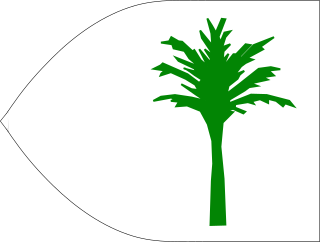
The Kanem–Bornu Empire existed in areas which are now part of Nigeria, Niger, Cameroon, Libya and Chad. It was known to the Arabian geographers as the Kanem Empire from the 8th century AD onward and lasted as the independent kingdom of Bornu until 1900.

The Jihad of Usman dan Fodio was a religio-military conflict in present-day Nigeria and Cameroon. The war began when Usman dan Fodio, a prominent Islamic scholar and teacher, was exiled from Gobir by King Yunfa, one of his former students.
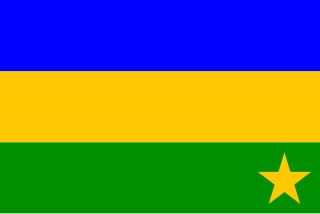
The Kanuri people are an African ethnic group living largely in the lands of the former Kanem and Bornu Empires in Niger, Nigeria, Chad, and Cameroon, as well as a diaspora community residing in Sudan. Those generally termed Kanuri include several subgroups and dialect groups, some of whom identify as distinct from the Kanuri. Most trace their origins to ruling lineages of the medieval Kanem–Bornu Empire, and its client states or provinces. In contrast to the neighboring Toubou or Zaghawa pastoralists, Kanuri groups have traditionally been sedentary, engaging in farming, fishing the Chad Basin, trade, and salt processing.

The Sokoto Caliphate, also known as the Sultanate of Sokoto, was a Sunni Muslim caliphate in West Africa. It was founded by Usman dan Fodio in 1804 during the Fulani jihads after defeating the Hausa Kingdoms in the Fulani War. The boundaries of the caliphate are part of present-day Cameroon, Burkina Faso, Niger, and Nigeria. By 1837, the Sokoto state had a population of around 10-20 plus million people, becoming the most populous empire in West Africa. It was dissolved when the British, French and Germans conquered the area in 1903 and annexed it into the newly established Northern Nigeria Protectorate, Senegambia and Niger and Kamerun respectively.

Muhammadu Bello was the first Caliph of Sokoto and reigned from 1817 until 1837. He was also an active writer of history, poetry, and Islamic studies. He was the son and primary aide to Usman dan Fodio, the founder of the Sokoto Caliphate and the first caliph. During his reign, he encouraged the spread of Islam throughout the region, increasing education for both men and women, and the establishment of Islamic courts. He died on October 25, 1837, and was succeeded by his brother Abu Bakr Atiku and then his son, Aliyu Babba.
Gidado dan Laima (1817–1842) also known as Waziri Gidado was the first known Grand Vizier of the Sokoto Caliphate, he was vizier of Sokoto during the sultanship of Muhammed Bello. He was the founder of the popular line of viziers known as the Gidado line; some of his descendants include Waziri Junaid and Abd al-Qadir (Sokoto), and in extension, Gidado Idris who was once Nigeria’s Secretary to the Government.

The Adamawa Emirate is a traditional state located in Fombina, an area which now roughly corresponds to areas of Adamawa State and Taraba state in Nigeria, and previously also in the three northern regions of Cameroon, including minor Parts of Chad and the Central African Republic.

The Wadai Sultanate, sometimes referred to as the Maba Sultanate, was an African sultanate located to the east of Lake Chad in present-day Chad and the Central African Republic. It emerged in the seventeenth century under the leadership of the first sultan, Abd al-Karim, who overthrew the ruling Tunjur people of the area. It occupied land previously held by the Sultanate of Darfur to the northeast of the Sultanate of Baguirmi.
al-Haj Idris Alooma was Mai (ruler) of the Bornu empire, covering parts of Chad, Cameroon, Niger and Nigeria. His achievements are primarily chronicled by Ahmad bin Fartuwa, his chief Imam. His reign marked the end of the Kanem civil wars within the state, reuniting N'jimi, the former capital, under Sayfawa control. Furthermore, he introduced significant legal reforms based on Islamic law, establishing qadi courts that operated independently from the executive branch. He is credited with leading the empire to what is often regarded as its zenith during the late 16th-century and early 17th-century.
Abd al-Qadir also known as Abdulkadir, was The Sokoto Grand Vizier (1842–1859). He was preceded by his father, Gidago dan Laima (1817–1842) and succeeded by Ibrahim Khalilu. Prior to his appointment as vizier, Abdulkadir participated in 25 raids under Sultan Muhammed Bello and four raids with his uncle, Abu Bakr Atiku. He was a close confidant of Sultan Ali and son of Nana Asma'u
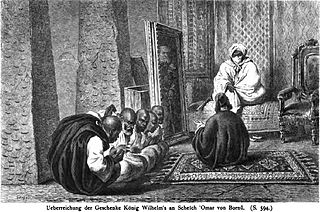
Umar I ibn Muhammad al-Amin or Umar of Borno was Shehu (Sheik) of the Kanem–Bornu Empire and son of Muhammad al-Amin al-Kanemi.
Dunama Lefiami was the Mai (sultan) of the Kanem–Bornu Empire, located in what is now Nigeria, Cameroon and Chad during the early nineteenth century.
The Farooqi dynasty or the Farooq Shahi was the ruling dynasty of the Khandesh Sultanate from its inception in 1382 till its annexation by the Mughal emperor Akbar in 1601. The founder of the dynasty, Malik Ahmad participated in a rebellion against the Bahmani ruler Muhmmad Shah I in his early years. When he was compelled to flee from Deccan, he established in Thalner on the Tapti River. After receiving the grant of the fiefdoms of Thalner and Karanda from Firuz Shah Tughluq in 1370, he conquered the region around Thalner, which later became known as Khandesh. By 1382, he started ruling independently.

The Sultanate of Darfur was a pre-colonial state in present-day Sudan. It existed from 1603 to 24 October 1874, when it fell to the Sudanese warlord Rabih az-Zubayr, and again from 1898 to 1916, when it was occupied by the British and the Egyptians and was integrated into Anglo-Egyptian Sudan. At its peak in the late 18th and early 19th century it stretched all the way from Darfur in the west to Kordofan and the western banks of the White Nile in the east, giving it the size of present-day Nigeria.

Shehu Muhammad al-Amîn al-Kanemi was an Islamic scholar, teacher, religious and political leader who advised and eventually supplanted the Sayfawa dynasty of the Kanem–Bornu Empire. In 1846, al-Kanemi's son Umar I ibn Muhammad al-Amin became the sole ruler of Borno, an event which marked the end of the Sayfawa dynasty's 800 year rule. The current Shehu of Bornu, a traditional ruler whose seat remains in modern Borno State, Nigeria, is descended from al-Kanemi.
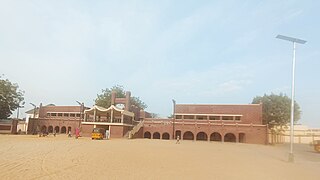
The Borno Emirate or Sultanate, sometimes known as the Bornu Emirate, is a traditional Nigerian state that was formed at the start of the 20th century. It is headed by the descendants of the rulers of the Bornu Empire, founded before 1000. The rulers have the title Shehu of Borno. The traditional emirate of Borno maintains a ceremonial rule of the Kanuri people, based in Maiduguri, Borno State, Nigeria, but acknowledged by the 4 million Kanuri in neighbouring countries.
Ibrahim or Ibrahim bin Umar al-Kanemi was Shehu of Borno from c. 1884 to c. 1885.
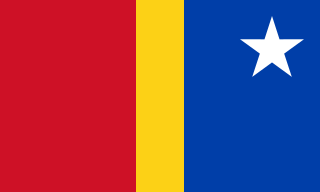
Ibrahim Dabo was the leader of the Fulani Sullubawa in Kano and founder of the eponymous Dabo dynasty. His progeny has lasted over two centuries reigning as Muslim rulers of the ancient city-state of Kano. The dynasty has become synonymous with the ancient city-state in affectionate sayings as "Kano ta Dabo Cigari". They have independently ruled the Kano Emirate from 1819 until the Battle of Kano in 1903 which as a result of British colonisation transformed into the Kano Emirate Council.

Shehu Umar Sanda ibn Ibrahim Kura al-Kanemi was the Shehu of Borno from 1922 to 1937. He was the son of Shehu Ibrahim Kura of Borno and brother of Shehu Abubakar Garbai.
Laminu Njitiya was a 19th-century Shuwa Arab aristocrat who served as an influential adviser to Umar bin Muhammad al-Kanemi, the Shehu of Bornu. He was often described as the most powerful figure in Bornu during the second reign of Umar.